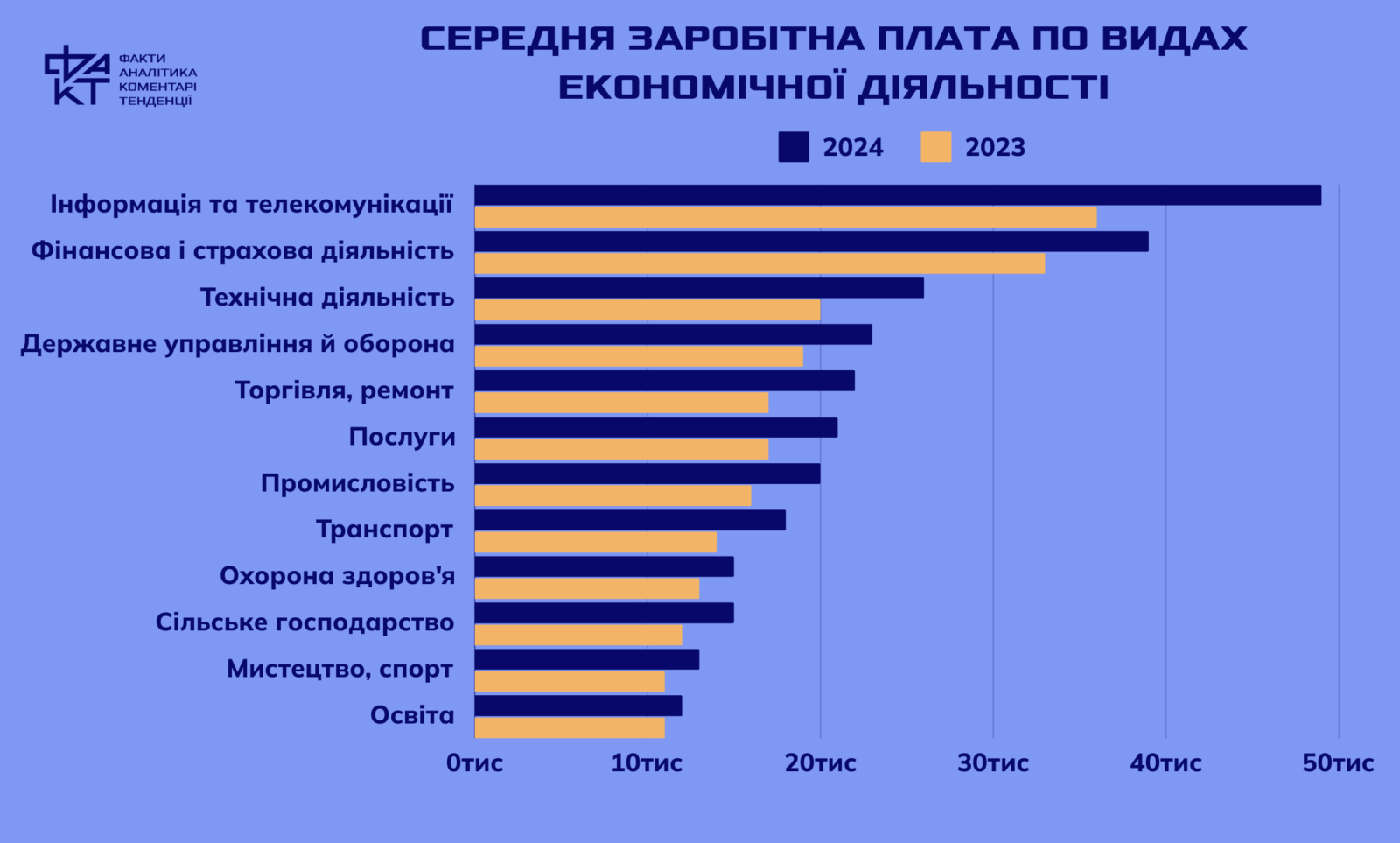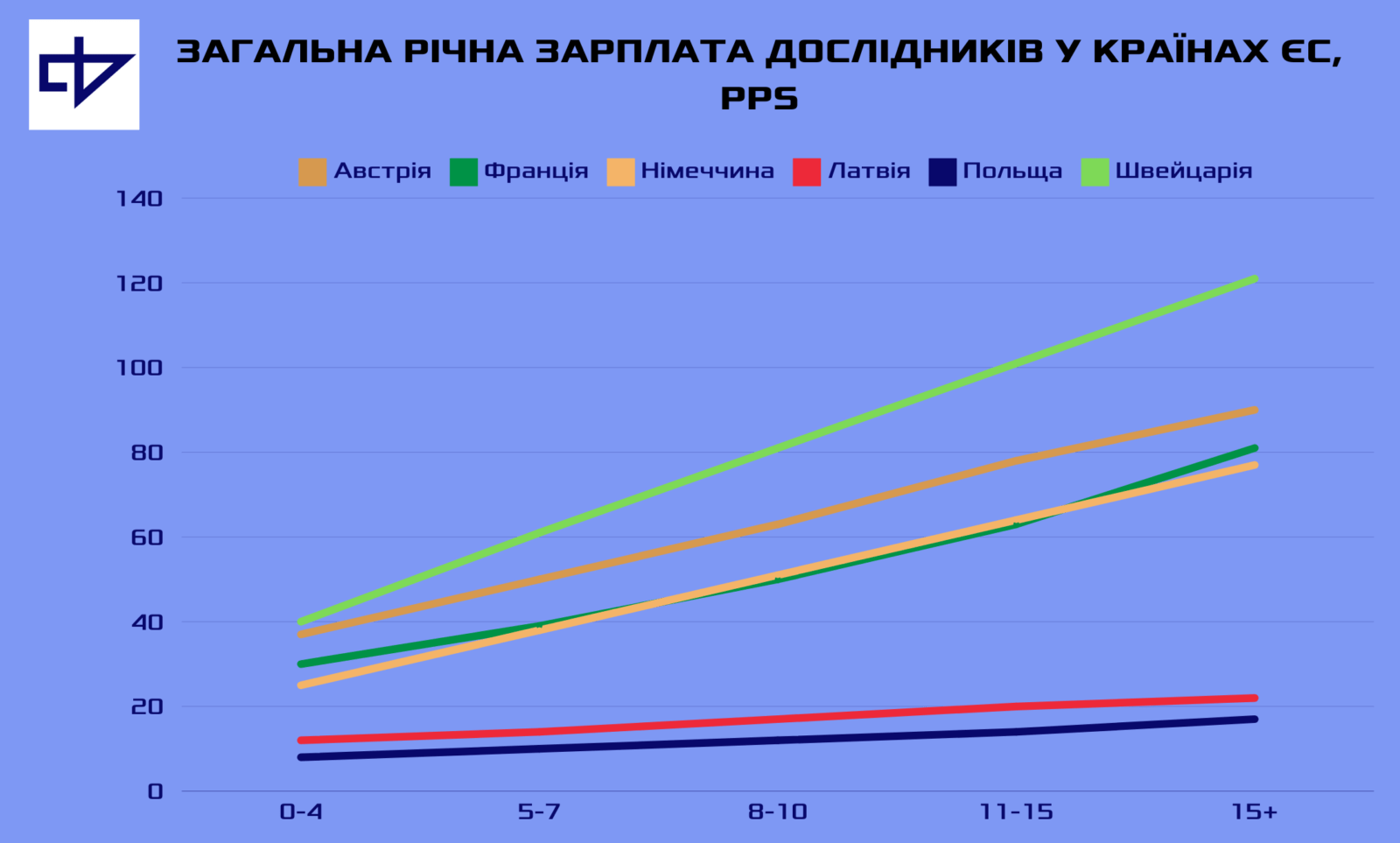Who needs education? How the personnel crisis and low salaries are destroying the future of Ukraine

Education in Ukraine is going through difficult times. Low wages, aging staff and a high level of bureaucratization of work repel young specialists and lead to the burnout of experienced teachers. This situation leads to a decrease in the quality of education and an even greater decline in the industry, which is the basis for the development of society and the state.
The crisis in the field of education and science has many components. One of them is financial.
Education comes last
Let’s turn to actual figures. By data According to the monitoring of current events in the economy (June, 2024), among all sectors, wages in the field of education are one of the lowest (12 thousand hryvnias).
This indicates a low material motivation for teachers, which can affect the quality of education and the outflow of personnel from the industry. In contrast, industries related to information technology, financial services, and public administration have significantly higher wages. This creates an imbalance where the best talent gravitate towards higher paying fields, leaving education without adequate support. It would be logical to assume that young people, given the choice, would rather go into higher-paying industries than into education, which could lead to further decline in the field.
 Infographic: IA “FACT”
Infographic: IA “FACT”
The average age of educators is 46 years
Part teachers under 25 years of age is only 5% in Ukraine.
At the same time, there are three times more educators who are over 50 and have 20-30 years of experience, i.e. 15%. Experience is not bad, but the existing age disparity shows otherwise: yesterday’s university graduates are in no hurry to stay in universities. There are many reasons, and all of them are valid.
Why is the field of education aging?
First, employment by profession inhibits the non-market level of salaries. Secondly, in order to at least somehow advance on the career ladder and, accordingly, to at least minimally increase the level of remuneration, young teachers need to obtain a scientific degree, then an academic title. This is also not enough to hold on to a position at a university. It is necessary to non-stop perform various types of work provided for by license requirements. Their range is impressive, because it includes both scientific activities (writing articles, monographs, speeches at conferences), educational and methodological activities (preparation and publication of manuals, textbooks), and active organizational activities (participation in the organizing committees of various competitions and Olympiads). For professors, this spectrum is even wider: there is management of graduate students, and work in specialized academic councils, commissions of the Ministry of Education and Culture, etc. The main work is performed by itself: the teacher must prepare and conduct lectures and practical classes, consult students, solve their urgent questions with them, prepare a report for a conference or a scientific article if necessary. This is not a complete list of all the things that higher school teachers should do in order to report decently from the contract at the end of the year and stay in their position.
However, even the exact fulfillment of all points of licensing requirements does not guarantee an educator that he will be retained in his position after the contract expires. The contingent will decrease (in simple words: students will not be recruited) – rates will be reduced. Probably, for the “painless” procedure for the universities to reduce staff, contracts with teachers are signed for 3-5 years. It’s no secret that in the conditions of the war and the crisis of the pre-war years, applicants gradually flow abroad. Sets “melt” – teachers lose their jobs. So many have a fair question: why spend your resources, including financial resources, to achieve compliance with the requirements, only to be thrown out by the system? Why immerse yourself in scientific research, pay considerable sums for the publication of your own research, write manuals, only to find yourself on the street as a result of another reduction and dream of at least a 0.25 bet in some new place?
A part of the rate is also a phenomenon typical for the field of higher education. Teachers are hostages of the student contingent, which depends on a lot of factors, so they are forced to agree to shameful pieces of the bet in order not to end up on the street.
Thirdly, the teacher’s work is currently extremely bureaucratized. The piles of papers that accompany the educational process are what turn away many creative and enterprising teachers who would be happy to devote themselves to teaching others, but the system inhibits their creativity and charisma and eventually discourages them.
Among the reasons that complicate the already difficult situation of educators is the online nature of education, which has “restructured” and brought the relationship between teachers and students to the point of absurdity. Educational platforms with built-in chats mean that teachers (especially curators) must be in touch with their students without exaggeration 24/7. Someone studies from abroad and has a different time zone – he also wants the teacher’s attention and help in solving a lot of questions. Someone works and misses steam, but is free in the evening – why not contact the curator at a convenient time? Someone just can’t sleep and he suddenly remembered an unfinished task… The teacher must be flexible and communicative.
And such, indeed, there are. But they quickly burn out and lose the strength necessary for teaching “service”.
Not work, but service
Thus, work in the field of education has always been pathetically called “service”. A stereotype has formed that this socially important activity, following the call of the soul, does not need external motivation, and even more so financial stimulation. Probably, that is why the salary remains at the lowest possible level in the domestic economy, and no motivational approach to the field of education and science is provided for in our country. It is no accident that we combined education and science with the conjunction “and”, since this is also a tradition based on the false stereotype of the effectiveness of a teacher and a scientist in “one bottle”. From the position of officials, anyone who researches a certain field has a great opportunity to tell about their achievements to student youth. It might not be a bad idea if the teacher could sow good and eternal only from those disciplines that coincide with his scientific specialty, when he has something to say and where he will be heard. Instead, teaching takes so much time that there is no resource left for real scientific experiments. Only post-graduate and doctoral students can devote themselves to science, who, of course, do not need to work part-time, because their scholarships are meager. Needless to say, there are very few of them.
Why motivation to the motivated?
The question is valid, but the inner call to scientific work and educational work quickly dissipates under the influence of material hardship and bureaucratic oppression. Instead, in countries that care about the development of science and education, young people are offered career ladders with gradually increasing rewards for intellectual contributions to the future of the country.
We offer review comparative graphs showing the dynamics of the total annual salary of researchers in EU countries depending on the level of experience.
All currencies here are brought to the standard of purchasing power, which allows you to compare the level of salaries in different states. As we can see, somewhere faster, somewhere slower, but the average salary is growing in all countries without exception. A university graduate who chose science for professional self-realization feels supported by the state and confidently moves up the career ladder.
 Infographic: IA “FACT”
Infographic: IA “FACT”
Instead, in our country, such motivation remains at the level of dreams, since the existing system does not offer sufficient support for scientists and teachers. The lack of prospects and low wages force young professionals to either leave the field of education or seek opportunities abroad, exacerbating the shortage of personnel and exacerbating the crisis in this important industry.





